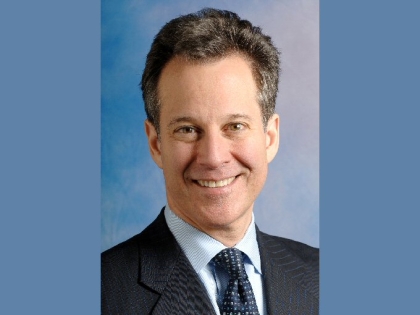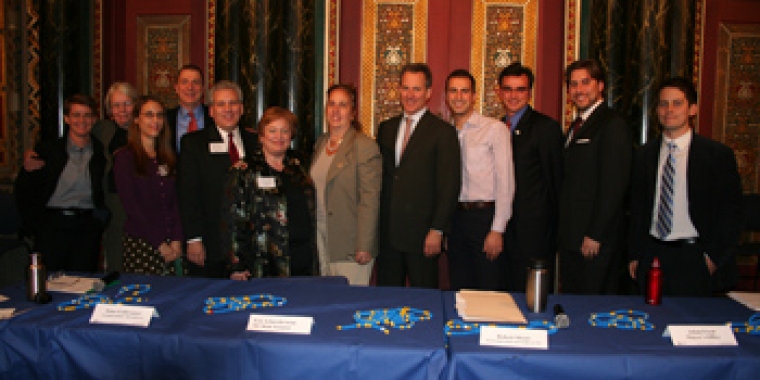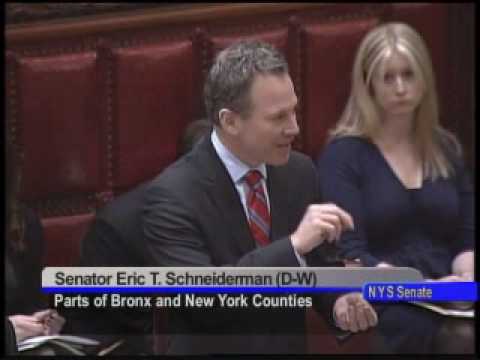
An Inconvenient Truth And Beyond: A Plan For Action

On Wednesday, November 12th, hundreds of New York City residents turned out for a post-election climate change event held at Congregation B'nai Jeshurun on the Upper West Side. The event, An Inconvenient Truth and Beyond: A Plan for Action, was sponsored by my office, Congregation B'nai Jeshurun, Manhattan Community Board 7, and Environmental Advocates of New York. The event was co-sponsored by a broad and diverse group of co-sponsors including Congressman Jerrold Nadler, Congressman Charles Rangel, State Senator Tom Duane, State Senator Bill Perkins, Manhattan Borough President Scott Stringer, Assemblymember Richard Gottfried, Assemblymember Danny O'Donnell, Assemblymember Linda Rosenthal, Council Member Gale Brewer, Council Member Inez Dickens, Council Member Melissa Mark Viverito, Coalition for a Livable West Side, Committee for Environmentally Sound Development, Church of St. Paul and St. Andrew , Earth Day NY, Environmental Defense Fund, Green Umbrella of Columbia University, Hazon, JCC in Manhattan, Landmark West!, League of Conservation Voters, Manhattan Hunter Science High School Environmental Club, Manhattan Together, Oxfam Action Corp NYC, Saint Gregory the Great Church, Sierra Club, Solar One, The Center School, Transportation Alternatives, Trinity High School, Trinity Lutheran Church, West Side Federation of Senior and Supportive Housing, Wildlife Conservation Society, Women's City Club of New York.
The event consisted of a live presentation of the climate change slideshow featured in former Vice President Al Gore's 2007 Academy Award winning documentary, An Inconvenient Truth. The presentation was followed by a panel discussion with environmental advocates including, Rob Moore, Executive Director of Environmental Advocates of New York, Chris Neidl, Advocacy Coordinator for Solar One, Peter Goldwasser, General Counsel for Transportation Alternatives, and Adam Freed, Senior Policy of the Mayor's Office of Long-Term Planning and Sustainability. The panel focused on federal and state legislation and the political climate following this month's historic election.
In addition to the Democratic victories in the national elections, the panel specifically discussed the implications of the new Democratic Majority in the New York State Senate, where Democrats now have an edge over Republicans for the first time in over 40 years. Democrats will also be in control of both the executive and legislative branches for the first time since the 1930's. Advocates are optimistic that the shift in the State Senate will allow a number of climate change bills and other environmental legislation that have passed in the Democratic Assembly, but died in the Republican-controlled State Senate, to receive additional consideration. Some of these bills include:
• Climate Change Solutions Act – This measure would keep resources generated by the state's role in the Regional Greenhouse Gas Initiative clean and green by establishing a framework for state spending on projects designed to decrease New York State's contribution to climate change, particularly in the arenas of energy efficiency and clean energy generation.
• Climate Change Solutions Fund – Establishes a dedicated fund for supporting energy efficiency programs and incentives for clean energy generation in New York State.
• Wetlands Protections Act – This legislation would close a loophole in the state's wetlands law that prohibits the state from protecting wetlands less than 12.4 acres in size.Smart Growth Infrastructure – This bill would protect New York's previous natural and fiscal resources by requiring that our state agencies conduct, expand or reconstruct public infrastructure to comply with smart growth criteria.
• Global Warming Pollution Cap – This measure would reduce New York State's climate change pollution from all sources gradually until overall greenhouse gas emissions are 80 percent below emissions for the year 1990.
• Flame Retardant – This bill would protect the health of our families by phasing out, by July 1, 2008, the use of a documented health hazard, decaBDE, a flame retardant in common use in covered electronic devices, upholstered furniture and mattresses.
• Health Green Procurement – This measure would set minimum specifications for healthy and green procurement by New York State agencies.
• E-Waste – This bill would remove tons of toxic e-waste from our landfills by requiring electronics manufacturers to collect and recycle at least one-quarter of their annual equipment sales (by weight) annually, and increase that collection rate to 45 percent by 2017.
The election of Barack Obama on November 4th proved that change can come from the bottom-up. The climate crisis before us has been well-documented by scientists throughout the planet, and we have a unique opportunity in our state and federal government to address the problem. With the help of concerned citizens actively working for change, like all the people who came out to the event, we can and we will take steps to lower our carbon footprint in the months and years ahead.
